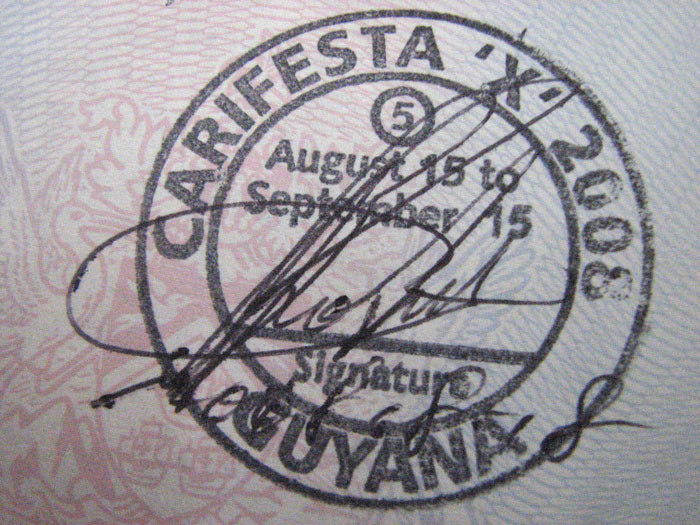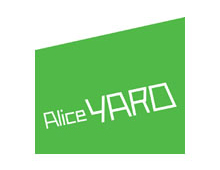Georgetown journal, part 1

Dear readers: are there any of you left? I didn't exactly plan for Antilles to go into hibernation for so long. But what with offline deadlines and travel commitments and the general press of life, it's been, I fear, two and a half months of silence. Shall we agree to call it a vacation of sorts? Since my last appearance here I've actually been working on the August issue of the CRB--running a bit late, alas, but finally gone to press now--and meanwhile what ought to be the major arts event in the Caribbean this year has snuck up on us. That's Carifesta X, of course, the tenth Caribbean Festival of Arts, hosted this year by Guyana. I say "ought to be" because the precedent set by the previous Carifesta, two years ago in Trinidad and Tobago, is not exactly encouraging. But Guyana seems to be going out all with their preparations, and there is too the fact that this is Carifesta's original home--Guyana hosted the first Carifesta in 1972, and a combination of national pride and national nostalgia seems to be at stake.
Well, success, failure, or in between, I'll witness it first-hand--for as I type this I am in Georgetown, and in fact have been for the last four days. I'm not a member of any national delegation, but have come here under my own steam to represent the CRB, in the first place, and to take in as much of the festival programme as I can, with an emphasis on the literary and visual arts events. In fact, I've just been watching the Carifesta opening ceremony live on TV--an extravaganza involving a thousand dancers, dozens of musicians and singers, colourful allegories of Guyanese history, and a forty-foot leopard. My other major achievement today was getting an all-events Carifesta pass at the festival secretariat--many of the events are strictly admission-by-ticket only, but I hope this pass will get me into the key ones. (After I saw her in action this afternoon, the Carifesta liaison officer dealing with foreign visitors won my immense respect--talk about grace under pressure!)
But to be truthful the events I'm most looking forward to over the next few days are not necessarily ones you'll find on the official Carifesta programme. Often, the best parts of big arts festivals like this are the encounters that happen informally if not spontaneously on the edges--random meetings, casual conversations, pleasing coincidences. And it seems there are moves afoot, led by the young Guyanese writer Ruel Johnson, to organise (on very short notice) a sort of festival fringe. If it happens, I'll certainly seek out the fringe events, and maybe even get more involved than merely spectating--stay tuned for updates. Ruel is also launching his new book of short fiction tomorrow, and he's asked me to speak then for a few minutes--it'll be an ex tempore performance, since I haven't seen the book yet! So look out for a few notes on that tomorrow evening--and I will try to post here a couple times a day, even if briefly, until I leave Guyana on Wednesday night (I'm going to miss the final couple of days of Carifesta, sadly, because of another travel obligation).








2 comments:
That was quite a 'holiday'. I enjoy this blog. It should be required reading for those interested in Caribbean writing.
The ghost of Andrew Salkey wants a word with you.
I'm sure a lot of Caribbean people will be interested to read your Georgetown Journal (take care Salkey don't pull yuh foot in the night). For my money, the first Carifesta in Guyana 1972 is still the best of the series, and it will be interesting to hear whether Guyana retains a more progressive approach to the arts than other recent hosts.
Recent Carifestas have demonstrated mainly that "The Culture" has become divorced from the culture. By which I mean that the region has settled into a bland, repetitive, self-congratulatory idea of what its culture is, an idea which has nothing to do with the way life is actually lived in the Caribbean or the issues which artists ought to be addressing. It is a fossilised, safe, politically controlled culture, in which any genuine artist will find it difficult to breathe.
Georgetown 1972 was exhilarating because the artists there were addressing Caribbean reality, through writing, music, theatre, dance, visual arts — trying to make sense of the society we live in, experimenting, taking risks, actually thinking. All that has drained away in recent festivals, leaving only the usual suspects performing the usual self-satisfied rituals.
Perhaps this in itself is a reflection of Caribbean reality in the early 21st century — weariness with politics, broken ideals, lost hopes, blandness, nothing left but wining and wailing. If so, artists of all sorts need to wake up: it is not enough to ritualise the prevailing despair. An artist without anything new and provocative and challenging to say is not an artist, merely a mimic (or self-mimic).
I hope your reports from Georgetown will tell us whether anything is stirring among the region's artists or not.
Post a Comment